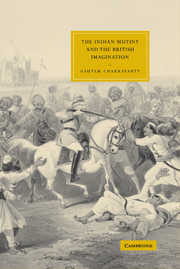Book contents
- Frontmatter
- Contents
- Acknowledgements
- Glossary
- Introduction
- 1 From chronicle to history
- 2 Reform and revision
- 3 Romances of empire, Romantic orientalism and Anglo-India: contexts, historical and literary
- 4 The ‘Mutiny’ novel and the historical archive
- 5 Counter-insurgency and heroism
- 6 Imagining resistance
- Epilogue
- Notes
- Bibliography
- Index list
- CAMBRIDGE STUDIES IN NINETEENTH-CENTURY LITERATURE AND CULTURE
2 - Reform and revision
Published online by Cambridge University Press: 22 September 2009
- Frontmatter
- Contents
- Acknowledgements
- Glossary
- Introduction
- 1 From chronicle to history
- 2 Reform and revision
- 3 Romances of empire, Romantic orientalism and Anglo-India: contexts, historical and literary
- 4 The ‘Mutiny’ novel and the historical archive
- 5 Counter-insurgency and heroism
- 6 Imagining resistance
- Epilogue
- Notes
- Bibliography
- Index list
- CAMBRIDGE STUDIES IN NINETEENTH-CENTURY LITERATURE AND CULTURE
Summary
Strike our roots into the soil, by the gradual introduction and establishment of our own principles and opinions; of our own laws, institutions, and manners; above all, as the source of every other improvement, of our religion, and consequently of our morals.
William Wilberforce, speech on the East India Company's Charter Bill (House of Commons, 1 July 1813)We have to consider what countries must be developed either by ourselves or by some other nation, and we have to remember that it is part of our responsibility and heritage to take care that the world, as far as it can be moulded by us, shall receive the Anglo-Saxon and not another character…
Earl of Rosebery, speech at the anniversary banquet of the Royal Colonial Institute (1 March 1893)LINEAGES OF AN AETIOLOGY
The idea that the Company administration had, through its failings, produced conditions for a revolt was initially put forward by the Anglo-Indian military, anxious to underplay the mutiny and deflect attention to civilian resistance. The idea meshed well with long-standing parliamentary discomfort with a mercantile company acting as a state, leading eventually to the Charter Act of 1833 which ended the Company's right to trade, after some eighty years of acrimonious public and legislative wrangling stoked by a broad spectrum of interests. That this legislative fretting could work as cover for merchant lobbies and partisan interests, or to keep a jealous eye on audit and preferment in a monopolist corporation with de facto statehood in a faraway land, ought to be seen alongside normative criticism of overseas investments by a Whig oligarch such as Burke, by free-trade theorists and by the Radicals, philosophic and otherwise.
- Type
- Chapter
- Information
- The Indian Mutiny and the British Imagination , pp. 49 - 71Publisher: Cambridge University PressPrint publication year: 2005

